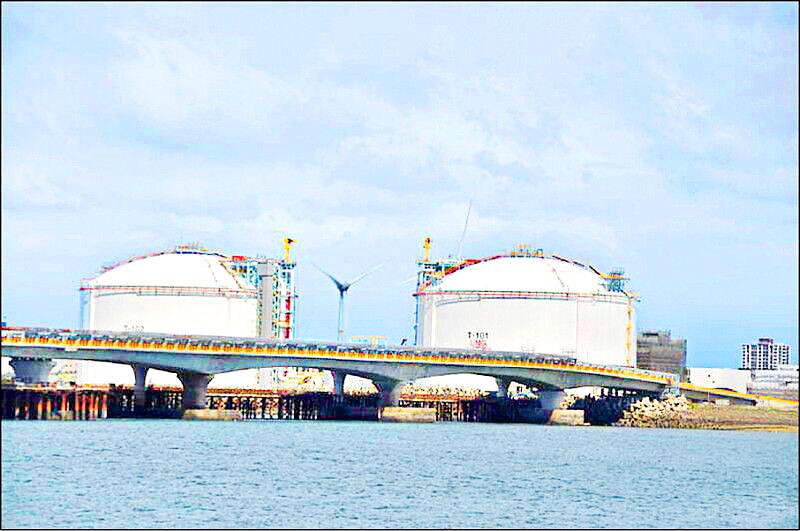State-owned oil refiner CPC Corp, Taiwan (台灣中油, CPC) is in early stage discussions to buy shale-gas-producing assets in the US, in a bid to secure natural gas supply to fuel Taiwan’s economy, three sources familiar with the matter said.
If a deal is struck, CPC would join a growing list of Asian companies taking ownership of US natural gas assets, gaining exposure to the commodity at a time when the US is expanding its export capacity by building more liquefied natural gas (LNG) plants.
Taiwan would also gain leverage with US President Donald Trump’s administration, which has linked imports of US energy with his tariff policy.

Photo: Taipei Times
CPC explored bids for assets held by public and private equity-backed gas producers active in shale formations that are well connected to existing or upcoming LNG plants, such as the Haynesville Shale in Texas and Louisiana, the sources said.
It has also considered bids for assets in mature plays, such as the Marcellus Shale in the Appalachian Basin, which have attracted more buyer interest over the past few years, as technological advancements have allowed operators to extract more hydrocarbons at lower drilling costs, they said.
The sources cautioned that a deal was not guaranteed, and CPC could still buy assets somewhere else.
Taiwan’s LNG imports have been rising steadily over the past 15 years, hitting a record 21.78 million metric tonnes last year, ship tracker Kpler data showed.
Some Asian companies, including CPC, have already bought stakes in various US LNG plants. Ownership in gas-producing assets can be a way for them to secure supply of the fuel to these plants.
In March, CPC signed an agreement with Alaska Gasline Development Corp to buy LNG and invest in the Alaska LNG project, which would transport gas south from Alaska’s remote north via pipeline and shipped as LNG to Taiwan, Japan and South Korea.
President William Lai (賴清德) said the deal would ensure the nation’s energy security.
CPC has also expressed interest in acquiring parts of private equity-backed Aethon Energy Management’s Haynesville assets, one of the sources said.
Aethon is in talks to sell the entire company to Japanese conglomerate Mitsubishi Corp, although a deal is not guaranteed, sources said.
Aethon declined to comment.
The Haynesville produces about 15.4 billion cubic feet per day, data from the US Energy Information Administration (EIA) showed, making it the third-largest gas producing region in the country and an attractive option for foreign buyers and investment firms.
The Appalachian Basin is the largest gas-producing region in the US, with output of 36.4 billion cubic feet per day, the EIA said.
CPC yesterday said that to enhance Taiwan’s energy security and self-reliance, it continues to diversify its layout and seek new sources of natural gas supply.
As the US has stable production capacity and a good investment environment, it has always been an area that CPC has been paying attention to, it added.
The company also does not rule out cooperation with promising prospects, CPC said, adding that it would make the best decision according to the assessment results and careful consideration of the nation’s energy policy.
Additional reporting by CNA

Taiwan is gearing up to celebrate the New Year at events across the country, headlined by the annual countdown and Taipei 101 fireworks display at midnight. Many of the events are to be livesteamed online. See below for lineups and links: Taipei Taipei’s New Year’s Party 2026 is to begin at 7pm and run until 1am, with the theme “Sailing to the Future.” South Korean girl group KARA is headlining the concert at Taipei City Hall Plaza, with additional performances by Amber An (安心亞), Nick Chou (周湯豪), hip-hop trio Nine One One (玖壹壹), Bii (畢書盡), girl group Genblue (幻藍小熊) and more. The festivities are to

Auckland rang in 2026 with a downtown fireworks display launched from New Zealand’s tallest structure, Sky Tower, making it the first major city to greet the new year at a celebration dampened by rain, while crowds in Taipei braved the elements to watch Taipei 101’s display. South Pacific countries are the first to bid farewell to 2025. Clocks struck midnight in Auckland, with a population of 1.7 million, 18 hours before the famous ball was to drop in New York’s Times Square. The five-minute display involved 3,500 fireworks launched from the 240m Sky Tower. Smaller community events were canceled across New Zealand’s

‘IRRESPONSIBLE’: Beijing’s constant disruption of the ‘status quo’ in the Taiwan Strait has damaged peace, stability and security in the Indo-Pacific region, MOFA said The Presidential Office yesterday condemned China’s launch of another military drill around Taiwan, saying such actions are a “unilateral provocation” that destabilizes regional peace and stability. China should immediately stop the irresponsible and provocative actions, Presidential Office spokeswoman Karen Kuo (郭雅慧) said, after the Chinese People’s Liberation Army (PLA) yesterday announced the start of a new round of joint exercises around Taiwan by the army, navy and air force, which it said were approaching “from different directions.” Code-named “Justice Mission 2025,” the exercises would be conducted in the Taiwan Strait and in areas north, southwest, southeast and east of Taiwan

UNDER WAY: The contract for advanced sensor systems would be fulfilled in Florida, and is expected to be completed by June 2031, the Pentagon said Lockheed Martin has been given a contract involving foreign military sales to Taiwan to meet what Washington calls “an urgent operational need” of Taiwan’s air force, the Pentagon said on Wednesday. The contract has a ceiling value of US$328.5 million, with US$157.3 million in foreign military sales funds obligated at the time of award, the Pentagon said in a statement. “This contract provides for the procurement and delivery of 55 Infrared Search and Track Legion Enhanced Sensor Pods, processors, pod containers and processor containers required to meet the urgent operational need of the Taiwan air force,” it said. The contract’s work would be